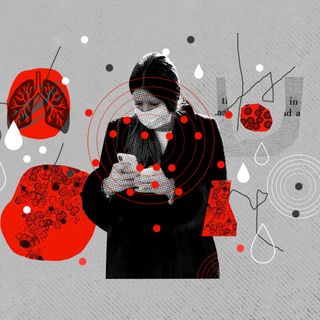Jaimini Shah, a 28-year-old media professional, was diagnosed with anxiety three years ago. But she says she hasn’t felt as bad as she’s feeling now. “The constant updates about coronavirus, the bombardment of information has made it so bad that it’s difficult to breathe,” she says. “I try to stay away from newspapers; I’ve deleted Instagram and Twitter from my phone. I avoid talking about it with anyone and I’m worried the social distancing will make it worse,” she adds.
For everyone with a prior history of mental health issues like Shah, the news about Covid19 pouring in every second is making their situation even more challenging. Some are experiencing difficulty concentrating or sleeping, and many others, a lot of anxiety.
Take, for instance, a tweet that read, “Coronavirus is beginning to really scare me, and it’s getting more and more serious by the day. I haven’t felt my anxiety like this for almost 2 years, but my chest is so tight, and I feel like I can’t get a full breath.”
People with pre-existing mental health issues have found themselves in a tough spot with their symptoms becoming worse with news of Covid19, Dr. Amir Khan, a doctor with U.K.’s National Health Service, tells Al-Jazeera. “I have had to adjust some of my patients’ anxiety medication during this difficult time,” he adds.
Related on The Swaddle:
Why Won’t People Stop Going Outside, Even During a Literal Pandemic
Shah recounts having gone through a similar experience. “My therapist has had to conduct a few extra telephonic sessions on how I can deal with it and made adjustments to my dosage,” she adds. “She feels it’s even more important to do it now because of social distancing, I’m not going to meet enough people to talk about how I’m feeling.”
Health experts are also worried, with no end in sight, about how long people will have to socially distance themselves or live in isolation. They worry there might be a surge in episodes of depression, panic attacks or even suicidal thoughts.
“One of my clients suffers from major depression and on losing her job due to coronavirus, she said she started suffering from suicidal thoughts,” says Amreen Sethi, a psychologist who runs a private facility in Mumbai. “Living in isolation can harbor feelings of loneliness, and could be a cause for suicidal thoughts in people already suffering from mental health issues,” she adds.
Dr. Seema Pawar, a psychologist from Mumbai, agrees. “With spending time alone, those who already suffer from depression or anxiety can have negative thought patterns that can exacerbate if they don’t talk about it with others or have means to keep themselves distracted.”
In the midst of so many people concerned about their own mental health, the World Health Organization (WHO) recently released a statement with recommendations that instructed people to avoid watching, reading or listening to the news if they feel anxious, along with taking practical steps to be able to protect themselves and loved ones.
Psychologists say these practical steps could include limiting the news intake and having downtime, especially from social media. The next important step could be exercising. “At this time, with being at home, the most important thing is to keep yourself physically active because it takes care of mental health too,” says Dr. Pawar.
The National Institute of Mental Health also advises people to continue with their treatment regimens along with setting up telehealth sessions, especially when practicing social distancing or isolation.
And lastly, the NIMH stresses on the importance of staying in touch with friends and family. “It is important to realize that social distancing doesn’t have to mean social isolation, especially with modern technologies available to many of us.”




